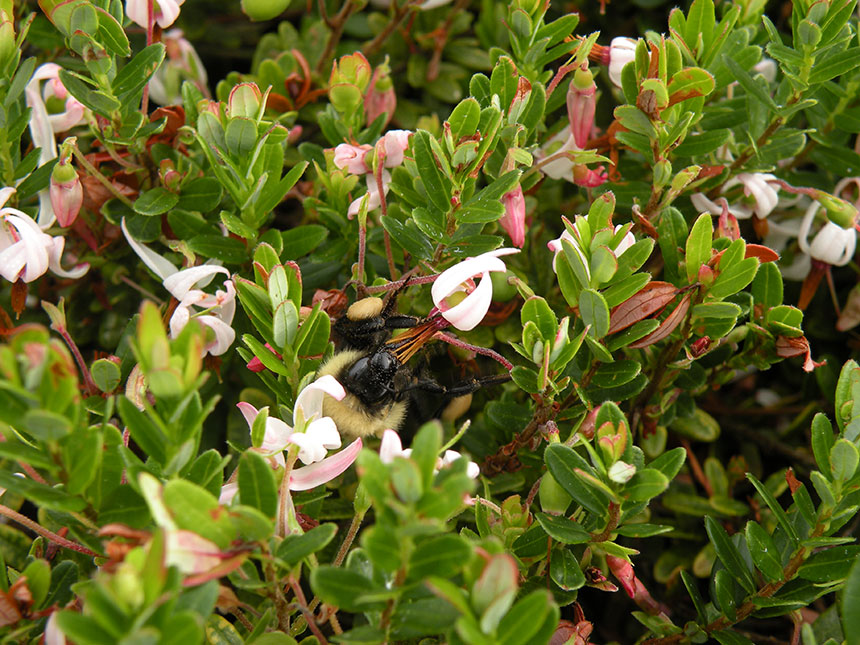
Pollinators and their habitats are in danger, and their critical role in our food system requires careful consideration and deliberate action. Honeybees alone are responsible for one out of every three bites of food we eat. Without healthy pollinator populations, our food system would struggle to provide enough food, experience decreased diversity of local foods, and face significant economic and employment loss. In Massachusetts, pollinators contribute to major agricultural crops that, if threatened, would negatively impact our local economy. For instance, cranberries are the state’s most valuable agricultural commodity, cultivated on about 13,500 acres and generating $1.43 billion in local economic activity, according to the Massachusetts Cranberry Revitalization Task Force. A threat to the health of pollinators jeopardizes this industry – the healthy food it produces, the income it earns, and the livelihoods of its 6,900 workers. And cranberries are not alone – the sustainability of much of the Commonwealth’s fruit and vegetable crops rely upon the health of our pollinators.
The Massachusetts Local Food Action Plan refers to pollinators in 10 action items that would promote pollinator health, protect and preserve pollinator habitat, and support native pollinators. Recommendations include the need for more research, education, and technical assistance, as well as consideration of policies and regulations that would protect and enhance pollinator habitat. Increased land conservation, and the formation of an advisory committee on pollinator issues are also recommended.
Four bills related to pollinators have been introduced in the Massachusetts legislature this session:
Bill H.2113 An Act to protect Massachusetts pollinators, filed by filed by Representative Carolyn Dykema, requires development of and compliance with training for those who use neonicotinoids in agriculture and horticulture. It also requires labeling seeds and plants grown with neonicotinoids, and the evaluation of potential pollinator habitat installation at solar energy sites.
Bills S.451 and H.2926, introduced by Senator Jason Lewis and Representative Mary Keefe are nearly identical. They both create commissions tasked with studying statewide opportunities to increase and enhance native pollinator habitat. They also both enhance and expand pollinator habitat in diverse areas for pollinator populations, call for research to identify best practices for promoting pollinator health, call for evaluating the adequacy of funding for pollinator protection efforts, and expand public education programs to address pollinator habitat loss.
Bill H.457 An Act to promote pollinator forage, filed by Representative Keiko Orrall, creates a list of plant species that are suitable forage for pollinators in Massachusetts, and promotes the planting of these species.
The collective impact of these bills would create protections and favorable conditions for pollinators to thrive in Massachusetts. They would also represent significant steps toward several of the Plan’s action items. Specifically, the Plan calls for increased education and technical assistance to ensure the health of pollinators, including education for beekeepers, pesticide applicators, farmers, landowners, municipalities, and regulators (Inputs 4.3.1), and for the development of a committee to review and address policies around pollinator issues (Farming 2.2.7). The Collaborative supports a science-based approach to these recommendations, that balances the needs of production and protection of the environment.
Most food system stakeholders agree that action must be taken to protect pollinators, but some disagree on exactly how to implement those protections. An Act to protect Massachusetts pollinators has both supporters and opponents, due to its proposed restriction of neonicotinoid use and distribution to certified applicants. Currently neonicotinoids are classified as general-use and sold without restriction, including at hardware and garden stores to the general public. While this restriction could serve to protect pollinators, it is not without cost to the agricultural and horticultural businesses that would need to comply with the law. These businesses would bear the upfront and ongoing costs associated with training and certifying applicators. Additionally, if growers were required to label plants grown with neonicotinoids, that could negatively affect the market for their product, given the negative campaigns around neonicotinoids. And of course, growers would need to seek out alternative pest management techniques if they chose not to become certified. It takes time and resources to adjust crop management plans. Growers work tirelessly each year to produce food and plants that support our local food system, and want to have access to all available effective tools.
Supporters of this bill point to research around the role of insecticides in pollinator die-off, and the connectivity of our ecosystems. Neonicotinoids can spread by environmental means, like many insecticides and pesticides, reaching beyond their target area, impacting pollinators and other species. Bees are the most active insect pollinators, and have quickly become the face of pollinator campaigns. Both managed honeybee hives and native bee species have gained strong public support as researchers continue working to concretely identify the significant decline in population in recent years. Several theories exist, many suggesting a collection of factors at work, to explain why this phenomenon wipes out so many hives each year. Studies have yet to find conclusive evidence implicating neonicotinoids as the main cause of pollinator die-off, but these insecticides are far from being absolved of affecting pollinator populations. Several states, including Connecticut, have already taken action to limit the use and sale of neonicotinoids in order to protect pollinators.
To keep up with progress on these bills, connect with local conservation and agricultural groups to learn more about their work around pollinators, like Conservation Law Foundation and the Massachusetts Farm Bureau.